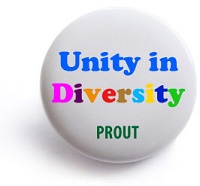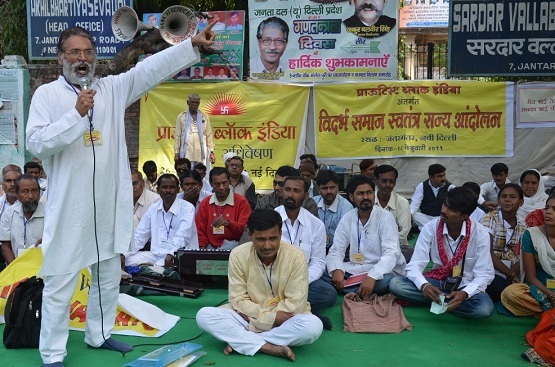 P.R. Sarkar
P.R. Sarkar
Dynamism is the essential characteristic of this world. The world is called jagat because it is always in motion.* Just as there is individual movement, there is movement in collective life as well. This very movement requires three things: First, an inspiration – an impetus from behind. When one person stops moving, another will have to push from …
Category Archives: Samaj
Act Locally, Think Universally
 PROUT claims Universality but promotes groupification along ethnic, linguistic, socio-economic and other lines. Isn’t it a contradiction in terms?
PROUT claims Universality but promotes groupification along ethnic, linguistic, socio-economic and other lines. Isn’t it a contradiction in terms?
PROUT’s concept of Samaj is dynamic and progressive. It is not a static concept such as nationalism. A samaj is defined by certain criteria, such as a common background, common needs, and common potentialities. Ultimately we all have the same background, …
PBI Demands Vidarbha State

Proutist Block of India (PBI) rally claiming a sovereign Vidarbha state,
Delhi Feb 28 2011
(March – 2011) – The movement for an independent Vidarbha is part of a greater PBI strategy seeking to establish 44 genuine samajas — self-reliant socioeconomic zones — in India. “The Maharastra government is unable to develop the state’s eastern areas where economic conditions are …
Unity and Synthesis
 P.R. Sarkar
P.R. Sarkar
In the practical sphere PROUT adopts the common factors amidst divergent views, and imposes these common factors on groups or bodies with conflicting interests by discouraging fissiparous tendencies. Thus PROUT advocates unity and synthesis in the face of diversity.
If we analyse recent historical developments we can see that wherever fissiparous tendencies arise and are allowed to dominate …
How to Unite Human Society
P.R. Sarkar
While trying to bring about the development and prosperity of individuals and society, we should encourage the common points only among different communities – not the points of difference. It is natural that there are differences in society concerning dress, customs, cultural expressions, food habits, language, etc. But if these points of difference are given undue importance, social …
Criteria for Socio-economic Groupification
 P.R. Sarkar
P.R. Sarkar
While forming socio-economic units, several factors should be considered. These include same economic problems; uniform economic potentialities; ethnic similarities; the sentimental legacy of the people; and similar geographical features.
1. “Same economic problems” refers to the common economic problems confronting people in a particular unit and may include the lack of markets for locally produced goods, surplus or …
Socioeconomic Units
 P.R. Sarkar
P.R. Sarkar
Socio-economic units should be formed throughout the world on the basis of the same economic problems, uniform economic potentialities, ethnic similarities, common sentimental legacy and similar geographical features [see criteria for socioeconomic groupification]. The whole of India and the entire world can be reorganized into socio-economic units based on these factors. These units should not merely be …
